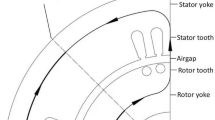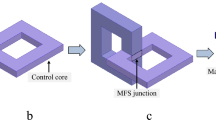Abstract
A LIMIT to the power output of most rotating electrical machines is set by magnetic saturation in the teeth of the punchings employed. Designers of these machines have, however, never had data available on the specific iron losses of the materials they use for alternating flux densities higher than about 75 per cent of the saturation value. The usual methods of measurement, applied to specimens of the material, fail completely at higher flux densities than this because the power factor becomes very-small and the magnetizing current very high. The former introduces difficulties when wattmeters are used, and the latter when thermal methods are contemplated. We have successfully used the following method.
This is a preview of subscription content, access via your institution
Access options
Subscribe to this journal
Receive 51 print issues and online access
$199.00 per year
only $3.90 per issue
Buy this article
- Purchase on Springer Link
- Instant access to full article PDF
Prices may be subject to local taxes which are calculated during checkout
Similar content being viewed by others
References
Cormack, Trans. S. Afr. Inst. Elect. Eng., 38, 257 (1947).
Author information
Authors and Affiliations
Rights and permissions
About this article
Cite this article
BRAILSFORD, F., BRADSHAW, C. Alternating-Current Energy Losses in Iron Laminations at Magnetic Saturation. Nature 172, 35–36 (1953). https://doi.org/10.1038/172035b0
Issue Date:
DOI: https://doi.org/10.1038/172035b0
Comments
By submitting a comment you agree to abide by our Terms and Community Guidelines. If you find something abusive or that does not comply with our terms or guidelines please flag it as inappropriate.



